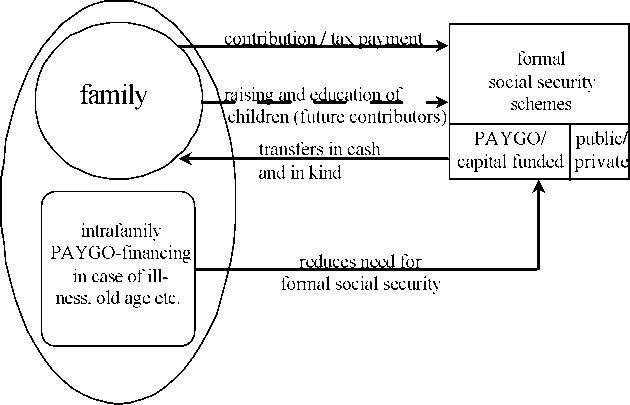Overview 1: Families and social security

In order to accumulate claims for social security, families can pay insurance premiums for
example in private life or health insurance or can contribute to social insurance schemes. And
families pay taxes (direct and indirect taxes) which are also used to finance transfers for
families themselves.
It is often argued that families contribute much more than only by monetary transfers towards
public budgets or private insurance companies, namely by raising and educating children (see
once more Overview 1). Children will be future contributors and tax payers. The argument
often used is that without children PAYGO schemes will not survive or will have severe
financial problems in case of low or even decreasing fertility rates because PAYGO financed
schemes need future contributors. This argument will be discussed below.
There is also the argument, that introducing and designing PAYGO financed social insurance
schemes - in particular the pension scheme - gives negative incentives for raising children,
because these schemes provide pensions in case of old age (or disability) even then when the
person never had raised a child. Children of other families will finance the living in old age not
only of those persons who have raised children but also of childless persons.3
This leads directly to arguments supporting the demand for improving the living conditions of
families which are outlined next.
3 See for example Nugent (1985); Cigno (1992); Sinn (1990, 1998).
More intriguing information
1. The name is absent2. The name is absent
3. The name is absent
4. The name is absent
5. Road pricing and (re)location decisions households
6. A model-free approach to delta hedging
7. The Trade Effects of MERCOSUR and The Andean Community on U.S. Cotton Exports to CBI countries
8. The name is absent
9. Standards behaviours face to innovation of the entrepreneurships of Beira Interior
10. Reform of the EU Sugar Regime: Impacts on Sugar Production in Ireland